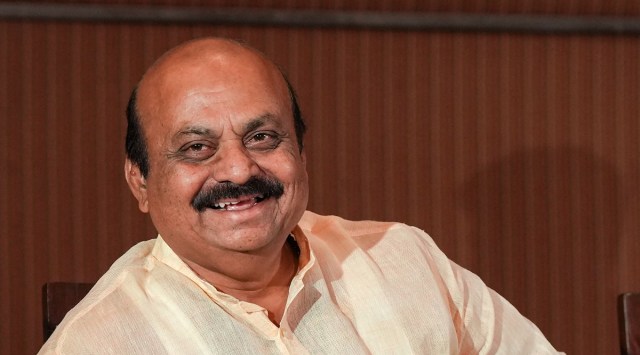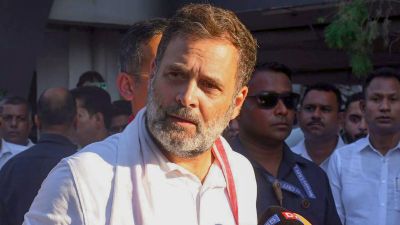The Supreme Court Thursday told the Karnataka government that a reading of its order scrapping the 4 per cent quota for Muslims in the state “appears to suggest that prima facie…the foundation of its decision-making process is highly shaky and flawed”.
This was underlined by Justice K M Joseph heading a two-judge bench hearing a writ petition challenging the Government Order (GO) by L Ghulam Rasool and Anjuman-E-Islam. The state has asserted that the Constitution does not permit reservation on the basis of religion.

Justice B V Nagarathna, the other judge on the bench, said the state could have waited for the final report instead of issuing the GO on the basis of an interim report and sought to know the “great urgency.”
Story continues below this ad
However, with the state as well as counsel appearing for some leaders of Vokkaliga and Lingayat communities opposing any stay and seeking a few days to reply, the bench declined to grant any interim relief sought by the petitioners.
Fixing the matter for hearing on April 18, the court recorded the statement of Solicitor General Tushar Mehta who appeared for the state that “no appointment or admission is going to be made until April 18 in pursuance of the GO”.
ExplainedChange before polls: plea
The petitioner argued that the state changed the status quo “overnight” without any enquiry or empirical data or report. The state said that reservation based on religion was unconstitutional and asked for a few days to reply so the SC declined to give interim relief.
Senior Advocate Dushyant Dave, appearing for Rasool, the lead petitioner, said the state’s decision suffers from malice in law as the GO was issued just two days before the announcement of Assembly elections. He argued that in the Maratha reservation matter, the SC had said that quota cannot be for political purposes.
Seeking an ad-interim stay of the GO, Dave said it is “completely unconstitutional and illegal” and “against” the reports of Justice Chinnappa Reddy and other commissions, and “against” judgements of the SC in the Mandal Commission and some other cases.
Story continues below this ad
The 4 percent reservation had, instead, been given to Vokkaliga and Lingayat communities because “they don’t want to displease others”, he said adding “we (Muslims) are dispensable”.
The bench wondered if a stay would not affect the reservation extended to Vokkaligas and Lingayats. “What will happen if we don’t stay now? What will happen if we stay now”, the bench asked Dave.
Dave responded that the state government had changed the status quo “overnight” without any enquiry or empirical data or report. He said that under a 1995 law, the state was bound to appoint a commission whose report is binding.
“That Commission gave a report. That report is holding the field. Today even the so-called interim report that they are relying on expressly says don’t touch the existing quota”.
Story continues below this ad
Dave said that according to the GO, when the category granting Muslims the quota was created in 2002 and they were classified as backward classes for the purpose of reservation, there was neither a recommendation by the body nor was there empirical data.
Terming these assertions incorrect, Dave said: “I’m shocked that the government can write these in a GO. I don’t know how a democratically elected government makes such a statement and takes away people’s rights”.
Justice Joseph sought to know what is the effect of Muslims being transferred from the category under which they were granted 4 percent reservation to the EWS category?
“I am losing my reservation straight away….They wanted to take it away. On the basis of empirical data collected year after year in Karnataka, it has been found that Muslims are a backward community and therefore reservation as contemplated under Article 15(4) and 16(4)…If they wanted to remove it, they can but after a study, their internal report says don’t touch it”, answered Dave.
Story continues below this ad
The petitioners contended that a stay of the GO will revive the 2002 notification extending the quota “which was legally and constitutionally given to” Muslims.
Opposing the prayer for interim stay, the SG said the petitioners had not given any definite answer “other than giving some hyperbole.” Mehta pointed out that sections of Muslims are already getting reservation under the Other Backward Class (OBC) category.
“What is done is no religion-based reservation. If there are some religions that are included, that is a mistake”, he submitted and urged the bench to give him time to file a reply.
Justice Joseph said that “what strikes me as a student of law is that this order is based on absolutely fallacious assumptions….” and asked the SG to convince him otherwise. Mehta said he would do that on the basis of documents but needed a few days to bring them on record. He urged the bench not to form a prima facie opinion.
Story continues below this ad
Appearing for some leaders of the Vokkaliga and Lingayat communities who filed an impleadment application, Senior Advocate Mukul Rohatgi also opposed the grant of interim stay saying it would affect the rights of the communities as the 4 percent quota had been redistributed to them.
“It is not only a case of cancellation of quota for one, but also grant of the quota to someone else. It has created a right in favour of someone else. So it’s not just them and the government”, he said, adding the petitioners had not made him a party.
Rohatgi referred to the 2010 Andhra High Court judgement staying the Muslim quota announced by the then state government and said reservations cannot be on the basis of religion.
Justice Joseph asked: “Then why are you giving to Christians?”
Story continues below this ad
Rohatgi responded that “It is wrong. One wrong cannot justify another. There is no negative article 14”.
“Then the reports of the backward classes commission should be thrown to the dustbin”, said Justice Joseph adding “what the government could have done is, they could have done a study”.
Mehta added that the reports are in the teeth of the constitutional embargo against providing reservation on the basis of religion.
Justice Joseph pointed out that in Kerala, Muslims as a community, enjoy SEBC reservation.“Then it’s unconstitutional. The Constitution does not allow religion based reservation”, said the SG adding the question is now pending before a Constitution bench of the SC.









